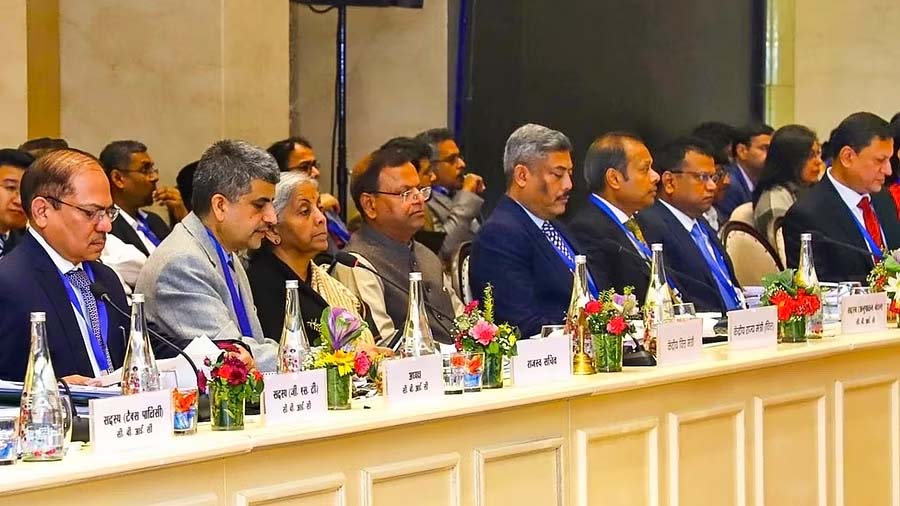JAISALMER, Dec 21: The 55th GST Council meeting commenced here on Saturday, where discussions are expected to revolve around the reduction of tax rates on health and life insurance, along with potential adjustments on 148 items.
The GST Council, led by Union Finance Minister Nirmala Sitharaman and including her state counterparts, will also consider the inclusion of Aviation Turbine Fuel (ATF) under the Goods and Services Tax.
A significant agenda item is to finalize the GST rate for health and life insurance.
A Group of Ministers (GoM) formed by the Council, under the guidance of Bihar Deputy Chief Minister Samrat Chaudhary, had previously agreed in their November meeting to exempt GST on insurance premiums paid for term life insurance policies.
Additionally, it has been proposed that the premiums paid by senior citizens for health insurance coverage be exempt from GST. Furthermore, premiums paid by other individuals for health policies with coverage up to Rs 5 lakh are also proposed to be exempt from tax.
Nevertheless, an 18 percent GST will still apply to premiums for health insurance policies exceeding Rs 5 lakh.
A conclusive decision on insurance taxation under GST is anticipated on Saturday, as most states are advocating for a tax reduction on premiums to provide relief to the public.
Several proposals from the Fitment Committee, which consists of officials from both the Centre and state GST departments, are set to be reviewed by the Council. One notable proposal includes reducing taxes on food delivery services such as Swiggy and Zomato from the present 18 percent (with input tax credit) to 5 percent (without input tax credit).
There may also be a proposed increase in the tax on the sale of used electric vehicles as well as small petrol and diesel vehicles, raising it from the current 12 percent to 18 percent. This adjustment aims to align the tax rates for older smaller cars and EVs with those of larger used vehicles, according to sources.
Additionally, the GoM responsible for GST compensation cess is expected to receive a six-month extension until June 2025 to finalize their report. The compensation cess regime is set to conclude in March 2026, and the GST Council has appointed a panel of ministers, led by Union Minister of State for Finance Pankaj Chaudhary, to determine the future direction of the cess.
Another key agenda item for the Council includes the report from the GST rate rationalization panel, which has proposed adjustments on 148 items. Earlier this month, the GoM decided to recommend increasing the tax on sin goods, such as aerated drinks, cigarettes, tobacco, and related products, from the current 28 percent to 35 percent.
The existing four-tier GST tax structure of 5, 12, 18, and 28 percent will remain, with a new rate of 35 percent being proposed by the GoM solely for sin goods. The GoM also suggested rationalizing tax rates on apparel, proposing that ready-made garments priced up to Rs 1,500 be taxed at 5 percent, while those priced between Rs 1,500 and Rs 10,000 should attract 18 percent.
Garments exceeding Rs 10,000 would incur a 28 percent tax. Currently, garments priced up to Rs 1,000 attract a 5 percent GST, with those above that threshold incurring a 12 percent tax.
The GoM has further proposed increasing GST on footwear priced over Rs 15,000 per pair from 18 percent to 28 percent. A similar increase in the GST rate for wristwatches costing over Rs 25,000 from 18 percent to 28 percent has also been proposed.
“Some of the easily achievable adjustments among the 148 items recommended by the rate rationalization panel may be addressed in the meeting. However, no significant major adjustments are anticipated,” remarked an official.
When asked about his stance on rate rationalization, Telangana Deputy Chief Minister Mallu Bhatti Vikramarka stated: “The taxation system should be more flexible and not burden the citizens. We will share our insights.”
The GoM has suggested lowering the GST on packaged drinking water of 20 liters and above to 5 percent from 18 percent, alongside reducing the tax rate on bicycles costing less than Rs 10,000 to 5 percent from 12 percent. Additionally, GST on exercise notebooks would be reduced from 12 percent to 5 percent. (PTI)


Leave a Reply